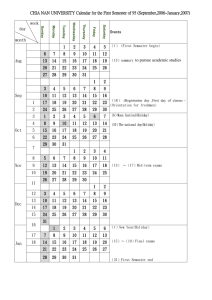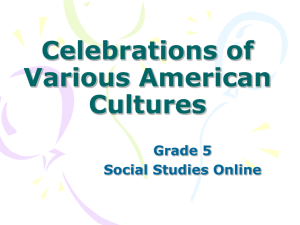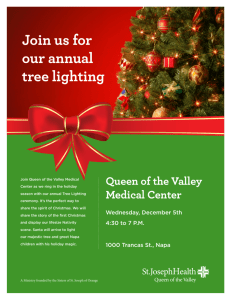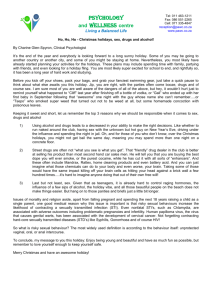holidaysCustomsTraditions
advertisement
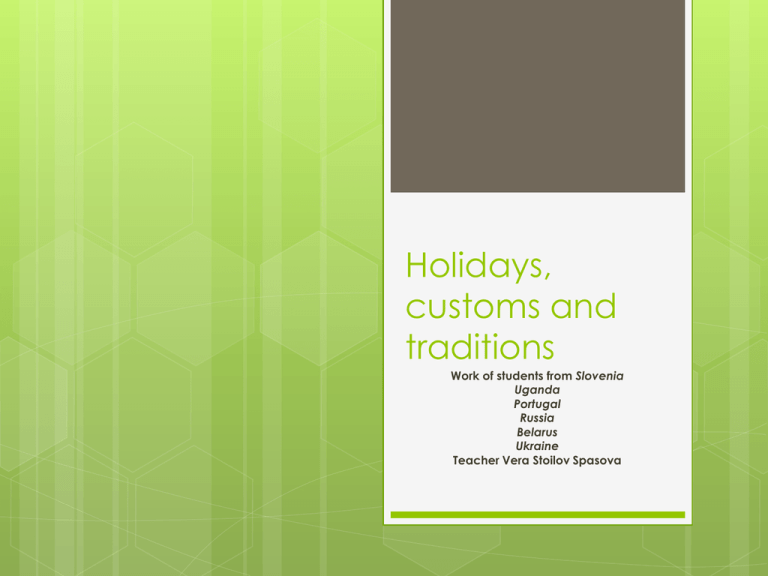
Holidays, customs and traditions Work of students from Slovenia Uganda Portugal Russia Belarus Ukraine Teacher Vera Stoilov Spasova New Year Everyone in our learning circle likes new year especially Belarus. Christmas People of orthodox religion have Christmas on 7th of January 26th January: Liberation Day Uganda Liberation Day marks the events of January 26, 1986, when the military junta was overthrown by the current government after a five-year civil war. Prešeren Day, the Slovenian Cultural Holiday 8TH FEBRUARY: on this day we honour our greatest poet dr. France Prešeren who died on this day in 1849 in Kranj (the town near our village). He wrote our national anthem Zdravljica. There are many cultural events in Kranj or other cities that we can visit Masliana Last week of February people in Ukraine celebrate Masliana. The tradition food at Masliana is varenyky and pancakes. Masliana is a women’s holiday, because they like foretelling. However, men celebrate this holiday too. Maslenitza – in the end of winter People in Russia bake pancakes and burn stuffed Maslenitza 8th March (Women‘s Day) 8TH MARCH: The international women’s day – we celebrate this day in our country as well. We give flowers to women. The birthday of Beata Maria Samarskaya – The 11’th of April THE CARNIVAL This day does not have a fixed date because it depends on Easter. It is celebrated from the weekend before Ash Wednesday till Shrove Tuesday. That is 4 days. It is the holiday immediately before lent (40 days before Easter). People wear masks and costumes in order to drive winter away, they come in groups, they don’t speak but they make a lot of noise and dance or sing. The traditional costumes vary from region to region. Children go from house to house where the get money, sweets or doughnuts (traditional food for this holiday). People are supposed to open doors to them because they bring good luck and good harvest. Nowadays children wear homemade costumes or they buy them in shops. Our school also organises events where the smaller children can come to school in their costumes. Here are some photos from Slovenia. Easter This holiday is celebrated on the first Sunday after the first full moon in spring. It is a holiday to celebrate the resurrection of Jesus Christ. On this day people go to church. They also have a traditional breakfast (cooked and coloured eggs called ‘pirhi’ (usually red) – they stand for Christ’s blood, horseradish – it stands for the nails, cooked ham – it stands for Christ’s flesh, potica (a special round walnut sweet – it stands for Christ’s wreath). There is a tradition of playing many games with the cooked and coloured eggs. One is called sekanje pirhov where the eggs are placed into a basket and the contestant has to stand 1,5 metres away and throw a coin into the egg in order to break it. Another is called valicanje pirhov where we use wooden rakes and roll the egg on the rake and try to hit another egg which is already on the ground. Easter Monday is also a state holiday. We usually make some traditional decorations in our school (Slovenia) and you can see some photos here or here. Ivana Kupala People in Ukrainie celebrate Ivana Kupala at night on 7th July. This day all girls make wreathes decorated with candles and put them in the river or in the lake. Boys catch these wreathes and, according to the legend, if the boy finds the wreath he should marry the girl who has made it. On this holiday a couple, a boy and a girl, should jump over the fire to prove their love. Tradition says that people celebrate the day decorating the streets with various colors and basil. Popular dances and marches are organized in the streets and the music is always present. In gastronomy, grilled sardines, peppers, bread, vegetable broth and wine are the main elements of the party. Some cities celebrate the holiday city of St. Peter on the day such as Povoa de Varzim, Sintra and Bombarral. 3rd June: Martyrs' Day • • • This marks the climax of the execution of twenty six Christians at Namugongo on June 3, 1886; by the major tribal King in Uganda. 22 of these were Catholic believers & were declared "Blessed" by Pope Benedict XV in 1920. A church was constructed pictured here. Pilgrimage is made by Christians to this spot on this day. 9th October: Independence Day This is the day when Uganda got independence from Britain, the colonial rulers, in 1962. • Muslims slaughter animals and serve themselves and others. It is required that the meat from the sacrifice of Eid al-Adha is given away to others and that one-third is eaten by immediate family and relatives, one-third is given away to friends, and one-third is donated to the poor. Christmas in Chatolic religion is celebrated annually on December 25. It's a special day to be with the family. Christmas celebrates the birth of Jesus Christ. At Christmas people usually decorate the house with lights , prepare the Nativity scene and the Christmas tree. The END Made by Nejc Lavtar and Andraž Žnidar From Slovenia Sources http://zlataleta.com/wp- content/uploads/2009/03/dan_zena620x3 30.jpg http://zlataleta.com/wpcontent/uploads/2009/03/dan_zena.jpg http://www.hervardi.com/zemljevidi/zn_sl ovenija.jpg Other SlideShows and Work from Word

